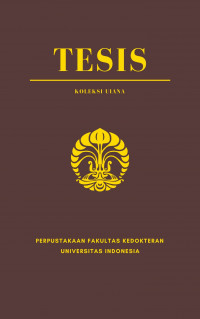Tesis
Analisis Kebutuhan dan Pengembangan Modul Dukungan bagi Caregiver Keluarga Lansia dengan Demensia di Kabupaten Sleman, Yogyakarta = Need Analysis and Development of Supporting Module for Family Caregiver of Elderly with Dementia in Sleman Regency, Yogyakarta.
Latar belakang: Problem perawatan lansia dengan demensia dan kebutuhan dukungan yang tidak terpenuhi dapat menimbulkan beban bagi caregiver keluarga lansia dengan demensia. Metode: Analisis kebutuhan caregiver menggunakan desain cross-sectional dan uji validitas isi instrumen Carers’ Needs Assessment for Dementia (CNA-D) versi Indonesia. Pengembangan modul dukungan menggunakan metode Delphi 2 putaran. Hasil: Hasil uji validitas isi instrumen CNA-D versi Indonesia didapatkan nilai I-CVI 0,93 serta S-CVI 0,94 untuk area problem dan nilai I-CVI 0,95 serta S-CVI 0,95 untuk area jenis dukungan. Problem perawatan yang berkorelasi bermakna dengan beban caregiver, yaitu: tidak ada ketrampilan merawat (r=0,293, p < 0,05); kesulitan melakukan tugas-tugas rumah tangga (r=0,304,p < 0,05); problem disebabkan adanya krisis (r=0,355,p < 0,01); beban diakibatkan situasi yang berbahaya (r=0,392,p < 0,01); dan kekecewaan yang disebabkan penyakit – memikirkan masa depan pasien (r=0,398,p < 0,01); problem komunikasi dan konflik dengan pasien(r=0,401,p < 0,01); tidak ada waktu untuk diri sendiri (r=0,406,p < 0,01); isolasi sosial-konflik dengan keluarga (r=0,430,p < 0,001); beban akibat problem perilaku pasien (r=0,598,p < 0,001); penyakit fisik atau psikis pada caregiver (r=0,517,p < 0,001); dan merasa burn-out karena proses perawatan (r=0,721,p < 0,001). Kebutuhan dukungan yang tidak terpenuhi > 50% adalah: konseling dan psikoterapi (83,3% - 92%), kelompok kerabat dipandu profesional (79,5%), psikoedukasi kelompok (78,6%), tersedianya informasi tercetak (76,8%), nasihat menyesuaikan rumah sesuai kebutuhan pasien (71,7%), informasi layanan (71,4%), pelatihan keperawatan sederhana (71,1%), terapi keluarga (68,8%), kelompok swabantu (67,9%), psikoedukasi individu (62,5%), dan pelatihan individu oleh perawat (57,9%). Hasil Delphi putaran II didapatkan rentang nilai IQR 0-1 dan nilai median 3-4 untuk 50 butir isi modul psikoedukasi kelompok yang disusun dalam penelitian ini. Kesimpulan: Instrumen CNA-D versi Indonesia memiliki validitas isi yang baik untuk area problem dan jenis dukungan. Problem perawatan lansia dengan demensia yang berkorelasi bermakna dengan beban caregiver adalah: ketrampilan merawat; kesulitan tugas rumah tangga; situasi krisis dan berbahaya; kecewa akibat penyakit dan masa depan pasien; komunikasi dan konflik dengan pasien; tidak ada waktu untuk diri sendiri; isolasi sosial dan konflik dengan keluarga; problem perilaku pasien; adanya sakit fisik atau psikis pada caregiver; dan merasa burn out. Salah satu kebutuhan dukungan caregiver keluarga yang tidak terpenuhi adalah psikoedukasi kelompok. Modul psikoedukasi kelompok yang disusun dalam penelitian ini dapat direkomendasikan sebagai salah satu bentuk dukungan bagi caregiver keluarga lansia dengan demensia di Yogyakarta.
Kata kunci: lansia dengan demensia, problem perawatan, kebutuhan caregiver, modul psikoedukasi.
Background: The caring problems of elderly with dementia and unfulfilled support needs can create burden for the family caregivers of the elderly with dementia. Methods: The analysis of the caregiver needs using a cross- sectional design and content validity test of the Indonesian version of the Carers' Needs Assessment for Dementia (CNA-D) instrument. The development of the supporting module using Delphi 2 rounds method. Results: The results of the content validity test of the Indonesian version of the CNA-D instrument obtained an I-CVI value of 0.93 and an S-CVI of 0.94 for problem areas and an I-CVI value of 0.95 and an S-CVI of 0.95 for a support type area. The caring problems correlated with the caregiver burden are: no nursing skill (r=0,293, p < 0,05), difficulties to perform household daily tasks (r=0,304,p < 0,05), problem caused by crises (r=0,355,p < 0,01), burden caused by dangerous situation (r=0,392,p < 0,01), and disappointment due to the illness – concerning patient’s future (r=0,398,p < 0,01), communication problems and conflict with the patient (r=0,401,p < 0,01), not enough time for oneself (r=0,406,p < 0,01), the isolation of social-conflict within the family (r=0,430,p < 0.001), burden due to patient behavior problems (r=0,598,p < 0,001), physical and mental illness of the caregiver (r=0,517,p < 0,001), and feeling burned-out due to the caring process (r=0,721,p < 0,001). The percentage of the unfulfilled supporting needs > 50% were: counselling and psychotherapy (83.3% - 92%), relatives group guided by a professional (79.5%), group psychoeducation (78.6%), printed information (76.8%), advice to adapt the house according to the patient needs (71.7%), service information (71,4%), simple nursing training (71,1%), family therapy (68,8%), self-help group (67,9%), individual psychoeducation (62,5%), dan individual training by a nurse (57,9%). The result of Delphi round II, a range of IQR values of 0-1 and median values of 3-4 for 50 items of the contents of the group psychoeducation module compiled in this study. Conclusion: The Indonesian version of the CNA-D instrument has good content validity for problem and support type areas. The problems of caring for the elderly with dementia that are significantly correlated with the caregiver's burden are: caring skills; difficulty with household tasks; crisis and dangerous situations; disappointed by the disease and the patient's future; communication and conflict with patients; not enough time for self; social isolation and conflict with family; patient behavior problems; physical and mental illness of the caregiver; and burnout. One of the unmet needs for family caregiver is group psychoeducation. The group psychoeducation module compiled in this study can be recommended as a form of support for family caregivers of elderly with dementia in Yogyakarta.
Keywords: elderly with dementia; caring problems; caregiver needs; psychoeducational module
- Judul Seri
-
-
- Tahun Terbit
-
2022
- Pengarang
-
Wikan Ardiningrum - Nama Orang
Profitasari Kusumaningrum - Nama Orang
Martina Wiwie S. Nasrun - Nama Orang - No. Panggil
-
T22126fk
- Penerbit
- Jakarta : Sp-2 Ilmu Kesehatan Jiwa., 2022
- Deskripsi Fisik
-
xv, 125 hal; ill; 21 x 30 cm
- Bahasa
-
Indonesia
- ISBN/ISSN
-
-
- Klasifikasi
-
NONE
- Edisi
-
-
- Subjek
- Info Detail Spesifik
-
Tanpa Hardcopy
| T22126fk | T22126fk | Perpustakaan FKUI | Tersedia |


Masuk ke area anggota untuk memberikan review tentang koleksi